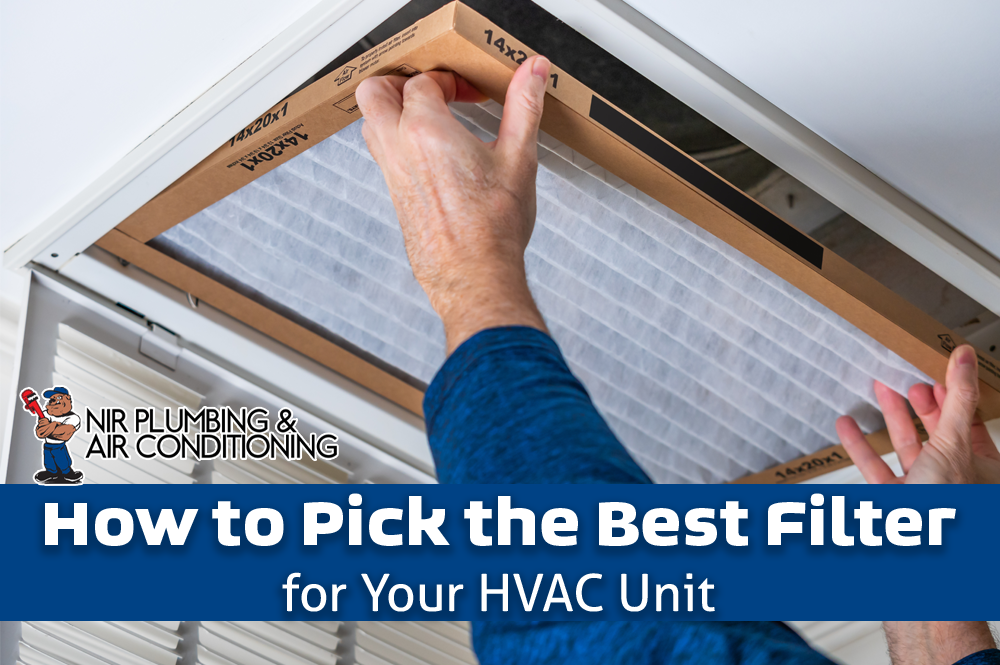[vc_row][vc_column width=”1/1″][vc_column_text]
Overview: In just a few seconds, learn how to determine which filter is best for your HVAC unit
You might have heard the advice to replace your air filter each month, but some filters are literally so effective that you won’t have to replace them until at least a year. This is because not all HVAC filter systems are designed equally. Depending on the specifications and requirements of your system – and your needs, of course – there are different filter options to choose from. How to choose the best filter for your air conditioner unit is where the true challenge arises.
Factors to Consider While Choosing a Filter:
There are some factors you should consider before making your decision about which air filter is the best pick for you. Let’s take a look at some of these factors.
Size of Air Filter:
Since there are various sizes available on the market, a little mistake during selection can affect the efficiency and performance of your HVAC unit. We don’t want to compromise on the air quality of our house! So to avoid contaminated air flowing throughout the house, make sure you’re choosing the right size of air filter – not too big, not too small. Here are some ways you can select the appropriate size:
-
Look for the label on the air filter frame. The most handy way to pick the right size for your air filter is to take out the current filter and analyze the frame. Usually, the normal size is always mentioned on the frame, and it’s usually a little different than the actual size.
-
Measure the old filter. If the filter size management doesn’t work, you have the option to measure the filter yourself. Take a measuring tape/device and measure the length, thickness, and width thoroughly. Don’t forget to turn your AC off before removing the filter slot to measure.
We hope these two steps work for you. But if you aren’t able to measure the size of your air filter, call the manufacturer or reach out to professional plumbers.
>> Related Reading: Why Air Filters Are Important
Low Cost and High Performance Filters:
Cost and performance go hand-in-hand. Air filters are the backbone of HVAC systems that one has to check regularly. With prices ranging from high to low, keeping things within a budget is always important. Here are your options:
Electrostatic Filters:
Also known as washable or reusable filters, these filters have lower costs and are long-lasting as they’ll be washed and used again. This options means you aren’t required to change your filter often. The result is that you save some bucks each year! (That’s always a win.) And one of the best things about having an electrostatic air filter is that it captures slightly bigger particles and has a lower MERV (minimum efficiency rating value) rating. You can read more about MERV ratings here.
Fiberglass Filters:
Unlike electrostatic filter, fiberglass filters aren’t washable or reusable. Although they’re available at a reasonable price range, they have a low MERV rating and don’t offer much to clean the indoor air quality. Another promising factor before finalizing your decision should be the performance and efficiency. Go for filters with higher efficiency such as:
Pleated filters that are made with cotton or polyester. These filters provide way better filtration for the contaminants in the air. They have a higher MERV ratings that help in cleaning up the 80% of the pollutants and dust. Pleated filters filter out even the smaller particles, providing density for healthy performance.
Hepa Filters also offer the best performance with the highest MERV ratings. Hepa filters suck out 99 percent of the pollutants including micro-particles. However, these filters are better for commercial use, as they may result in restricted airflow should we place them in our homes.
Different HVAC Filters:
A good air filter not only keeps the central air conditioner healthy by protecting the mechanical from dust or debris, but also hums a sweet melody (the one we like to hear in the scorching heat) that isn’t too loud.
From an environmental perspective, the concentration of air pollutants is five times higher than what we find outdoors. We gauge how well the air filters remove dust and pollen to allow the air to flow through the filters. We calculate the annual/monthly costs of replacement based on the recommendation of manufacturers.
“We find that thicker filters have two big advantages: They filter particles out of the air better and require replacement less often,” says Misha Kollontai, who oversees CR’s air filter testing. But not every HVAC system can accommodate a thicker filter. The most common size is 1 inch wide (though you can retrofit the ductwork of some systems to accept one).
In Summary:
Choosing the right air filter gives longevity to your HVAC unit. When we think about the comfort of a home, one of the first things to cross our mind is how warm or cold the place is. Home is our safe haven, so let’s make sure we’re making the right investment. Feel free to reach out to us for further queries.[/vc_column_text][/vc_column][/vc_row]


